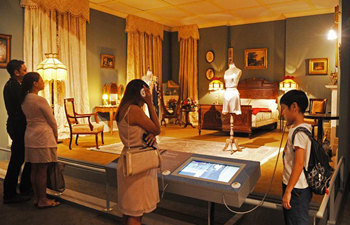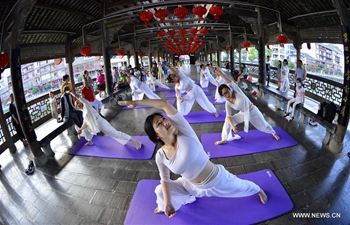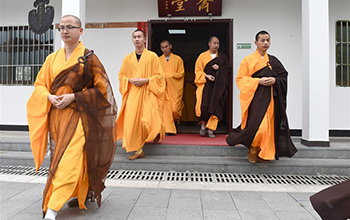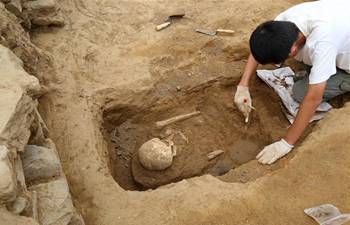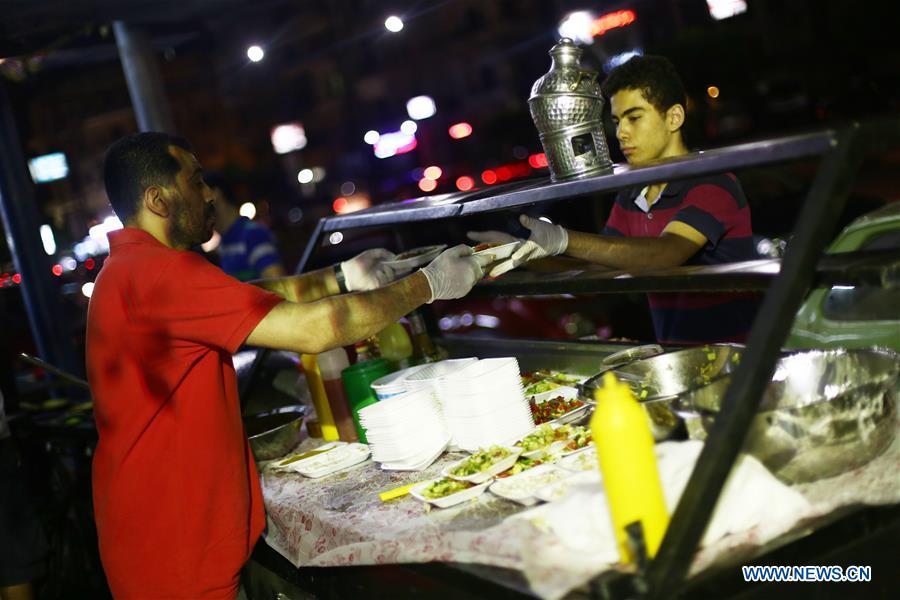
Egyptian young men prepare food at a "Bean Cart," a small street food stand that serves the traditional pre-fasting meal, known as Suhur, during the Muslim holy month of Ramadan, on the sidewalk in Heliopolis suburb in Cairo, Egypt, on June 19, 2017. The unique bean carts are operated by a group of highly educated young Egyptians, who hope to use part of the revenues for charitable activities. "The main purpose of starting this project last year is charity," Hussein Hamza, a 30-year-old cofounder of the project, told Xinhua. The group only work during Ramadan and use about one third of the revenues "to bail out debtors, provide food meals for the poor, help with expenses of orphan marriages, pay for expensive surgeries, " Hamza said. (Xinhua/Ahmed Gomaa)
CAIRO, June 20 (Xinhua) -- It is after midnight at a main street in the classy Heliopolis suburb in Egypt's capital Cairo, when a crowd gathers around a food stand on a sidewalk.
They are attracted to the "Bean Cart," a small street food stand that serves the traditional pre-fasting meal, known as Suhur, during the Muslim holy month of Ramadan.
Although bean carts are popular in Egypt during Ramadan, this one is unique as it is operated by a group of highly educated young Egyptians, who hope to use part of the revenues for charitable activities.
Indeed, Ramadan is a special time for charity activities for Muslims.
"The main purpose of starting this project last year is charity," Hussein Hamza, a 30-year-old cofounder of the project, told Xinhua.
The group only work during Ramadan and use about one third of the revenues "to bail out debtors, provide food meals for the poor, help with expenses of orphan marriages, pay for expensive surgeries, " Hamza said.
Hamza, together with his brother Abdel-Aziz, or Zizo, started the project last year. Zizo runs another food stand a few kilometers away.
Under the motto "Eat what you can, pay what you can," the brothers set relatively lower prices on the food they sold last year. But the recent skyrocketing prices of food ingredients forced them to raise the prices to ensure the 30-day project can generate enough revenues to help as many poor and needy people as they can.
The "Bean Cart," lit by a line of bulbs and decorated by a curtain of colorful, ornamented plastic pieces, looks like a bright spot at the dark sidewalk adjacent to the wall of Lycee Francais School.
"I come here to have Suhur because the workers are my friends, and I also love the food quality and the cleanliness here. " Ibrahim Khalil, a 33-year-old customer, told Xinhua.
The traditional Suhur in Egypt, the Ramadan pre-dawn meal in preparation for fasting from dawn till dusk, mostly consists of fava beans, smashed or fried beans, as well as eggs, cheese, yogurt and salad.
Traditionally, bean cart workers are mostly uneducated. But this is not the case with "Bean Cart" staff members, as they have well-paid jobs during the day and only come out at night to help with the charitable project.
The members of the group include a pharmacist, an accountant, a swimming trainer, an engineer, a lawyer, among others.
"I am a pharmacist and I work at Bean Cart after I finish my shift at a pharmaceutical company. We as friends came up with the idea of this project as a collective act of charity," said 30-year-old chemist Ahmed Hassan.
He said his charity work was strongly encouraged by his parents, who are regular patrons of the stand and even pay more than other customers to show their support.
The Bean Cart project, which is actually not a single cart like the traditional ones, includes a number of stands, which prepare a variety of different food and desserts for sale.
Women are not usual customers of bean carts, especially in poor neighborhoods where they come from. However, this one in Heliopolis attracts all kinds of people, men and women, rich and poor, old and young.
Charity helps the project sell better than others, of course. The Bean Cart workers do not accept tips. Instead, a customer can put a tip into the small charity box placed on top of one of the stands.
"We came here last year and we liked it so much. We come several times for Suhur during Ramadan," Lena Mazen, an engineer in her early 30s, told Xinhua while eating with her sister and two other relatives.
Abdel-Rahman Mohamed Anwar, a high school student that patronized the stand for the first time, was moved by the project after leaning about the charity work behind it.
"I have just learned about their charitable ideas, and I will urge all my friends to come and have their Suhur here," he said.




